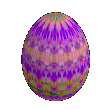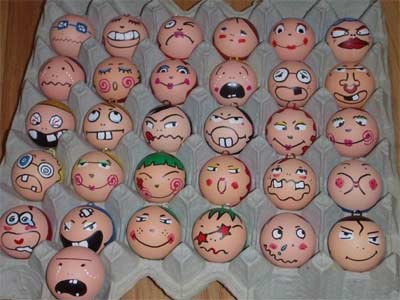
Posted on 04/10/2009 4:55:11 PM PDT by Diana in Wisconsin
Paas is passe.
The 125-year-old company has expanded its Easter egg dyes, but no Funky Foil or Hard Boiled Hardware type kits are needed by craftistas, including Anne Walker.
She describes herself as an organic landscape gardener for 25 years -- since back when it was "quirky," she jokes at her fairytale home on Madison's East Side. Here the oven is pink, the cupboards sky blue and the ethic green, whether she's working for clients through her Home Land Garden LLC business or decorating eggs to show visitors the magic of cinnamon, spinach and old red wine.
She started thinking out of the Paas box in earnest last spring to prep for a natural egg decorating class she taught through Olbrich Botanical Gardens.
Any Mom could follow Walker's approach to choosing dyes: "I went to the Willy Street Co-op and I thought about what would make a white shirt get stained."
She expanded her search to her home, starting with the spice cabinet.
"That's how I came up with the most beautiful egg I did," she says, displaying an egg dyed in cinnamon water to which she had added sugar. She considered it a dud until it dried to a sparkly finish.
"Onion skins are fabulous for dyeing," she continues. "You get those mottled beautiful coppery tones."
Yards can yield more options, such as those non-native invasive species gardeners have since learned were a mistake to plant. Japanese knotweed (Polygonum cuspidatum) isn't closely related to bamboo but the stems look similar and yield tan to gold color. For a look at this and other nonnative invasive species you might have growing in your yard (but do not plant if you don't), check the Wisconsin Department of Natural Resources site, which displays photos of invasive plants at dnr.wi.gov/invasives.
Referring to her methods and the amounts of natural materials, she explains, "This is sort of trial and errorish," then amends that to "trial and trialish."
After all, there are no mistakes, just surprises when she dyes eggs overnight in blueberry juice and wakes up to rich black eggs, when she experiments with Burt's Bees lip gloss in a color that looks better on an egg than on her lips, or when she opens the plastic wrap or preferred parchment paper surrounding an egg nestled with pounded fresh spinach, grated fresh beets or chunky annatto coloring.
"It's so wonderful to have something that's just unique," she says.
She is relaxed about recipes and directions and uses raw or hard-cooked eggs because it's too much effort to poke holes on either end and blow them out as she used to for Easter.
"I'm much more of a low-maintenance gal these days," she says, later showing that natural brown eggs she purchased or light green eggs from a friend's chicken are perfect as is, nestled with sedum and lentils spilling over tea plates or displayed with her collection of fabrics, Christmas and Mardi Gras decorations, costume jewelry and other repurposed items that grace her table settings.
Natural materials for dyes
Yellow or orange: Golden beets (chopped and boiled in water), ground cumin, turmeric, paprika, yellow onion skins or annatto, which is used to color Cheddar cheese (available at the Williamson Street Grocery Cooperative).
Tan or brown: Cinnamon sticks, walnut shells or hulls, coffee or coffee grounds, tea or chili powder (a reddish brown) … or just buy brown eggs.
Red: Cherry juice or concentrate, red wine (which yields sparkling eggs), beets or beet powder (available at the Williamson Street Grocery Cooperative, sold for making pasta and other dishes).
Purple or blue: Grape juice or concentrates, red onion skins, red cabbage leaves, blueberries, violets.
Green: Leaves such as spinach or the invasive garlic mustard, which should be up by now.
Basic warm bath method
(This technique produces more saturated color, although Walker also uses cold liquids or no liquid.)
1. Add natural material to a pot with enough water to cover the materials and yield enough liquid for dyeing eggs.
2. Boil covered until the liquid reaches the desired color intensity.
3. Add 1-3 teaspoons vinegar or cream of tartar, which helps the color set.
4. Leave colored water in the pot for dyeing or pour into a smaller container if needed for dyeing. If using cinnamon sticks, remove; for spinach and most other materials, there is no need to strain before using the liquid as dye. Tip: Do not add vinegar to spinach water or you'll lose the green color.
5. Add cooled hard-cooked eggs or raw eggs and leave in until dyed as desired. When planning to eat the eggs later, this step should be done in the refrigerator.
Variations
• For sparkle, add a handful of sugar after step 2 and let cook down before using to dye egg. Or just dip a dyed egg into sugar water. Note: The sparkle won't show up until the egg is dry.
• Place egg in old red wine and let stand until desired color.
• Smash a couple of berries onto an egg. Leave on longer for darker color.
• For a two-toned egg, dye an egg with a solid color, then when dry put enough of a different color in a dish and add a tablespoon of olive oil; run a fork through it for a streaky look, then roll the dyed egg in it.
• Grate yellow or red beets or smash spinach or other plant leaves, place on square of parchment paper, add egg, wrap and leave longer for more intense color.
• After using annatto to create a dye, strain it and wrap the chunky annatto around an egg for a blotchy look.
• For a geometric design, wrap rubber bands around the egg before placing in the dye. Let dyed egg dry before removing all rubber bands -- or remove just some and dye in a second color.
• Melt beeswax in the top of a double-boiler and use to cover the area of an egg you don't want colored. To remove, carefully heat egg over a candle and rub melted wax off with a cloth. Dye in a second color if desired.
Tip: "If you have trouble getting the wax out of the pan, throw it in the freezer and it pops right out," Walker says. Shortcut: Use a chunk of beeswax to draw on an egg before coloring.
Tips for displaying eggs
• Nestle particularly beautiful eggs in a bowl of lentils or marbles, on a napkin ring or shot glass, in the squishy center of a ball of yarn, on a pile of Mardi Gras beads or silver pull chains sold for old-fashioned lights.
• Substitute scarves for grass. Warning: Make sure eggs are dry before displaying them, for example, on your favorite scarf.
• Fill an Easter basket with low plants, such as little ferns, grasses or even succulents, then arrange eggs on top.
• Costume jewelry can be a good addition to a basket, adding glitter or color. Tip: Stick the pin of a brooch into a twig to create a "flower."
• Add a string of little white lights to a basket of eggs.
Weird Easter egg trivia
In parts of Germany during the 1880s, Easter eggs substituted for birth certificates. The egg would be dyed a solid color then a sharp tool used to scratch in a person's name and birthday, Walker explains, joking, "God forbid you break your egg!"


You know, it is STILL quirky. Kind of like whole wheat brownies. YUCK!
I love coloring eggs.

Very pretty!
We’ve dyed our Easter Eggs in the following way since I was a little kid. Mom makes Wedding and all-occasion cakes, so she always had gorgeous PASTE food coloring around for us kids to mess with. I don’t remember where this idea came from, but I’m sure my uber-creative Mom thought it up:
*Hard boil your eggs, let them cool.
*Take old rags and wet the with warm water; wring out until just damp. (Pieces of old towel, old t-shirts, etc.)
*Select three colors of PASTE dye and randomly streak it across your damp rag with a toothpick. (Don’t use more colors or you’ll just get brown, icky, ugly eggs.)
*Wrap the egg (GENTLY) in the rag and roll it around a little. Take a peek. If you like the swirling color combo...STOP. If not, roll it around a little more.
*Set the eggs to dry in a carton turned upside down (use the in-between indentations to dry the egg so it’s not touching the edges too much.)
*When eggs are dry, give them a light coating of Criso (lard, shortening) using a clean rag. Again, let them sit (in the fridge) overnight. Eat them on Easter Sunday as egg salad or talk Mom into making Deviled Eggs. Yum! :)
They are SO pretty. You gotta try it to believe it. :)

My friend Sharon designs those Ukranian eggs. I can’t believe she hasn’t gone insane, or blind yet, LOL!
Those truly ARE works of art.
 This site has examples of some really offbeat Easter eggs.
This site has examples of some really offbeat Easter eggs.

Cool! Loved the “Kiss” eggs, LOL!
I have done several of these techniques over the years, but have never seen such a complete set of instructions all in one place...it would have saved a lot of trials and errors.
The comment about the vinegar and spinach (other greens too, and tea)would be outstanding to have known!
Thanks, forwarding to grandchildren now!
I have friends who do them all year ‘round ......a few weeks before Easter is enough for me. It can be very tedious.
I’m glad you appreciate them ...I love the
“natural” ones too in your article ... dying cloth and natural batik is very similar.
We have about 40 laying hens.
Most of their eggs are decorated in natural hues of chicken sh!t.
Nothing a little soap and water won’t clean.
Natural dyes work great with wool yarn, too.
VERY interesting, when you’re too lazy to get off the chair, wonder where everyone’s at....and go to Chat.
:)
Gotta save this....
Very clever. Makes a lot of sense, too.
We’re going to try it.
I’m a chicken farmer, too! I have a flock of 50 mixed brown layers and Araucanas who lay the pink, buff, blue, khaki and green eggs. They ARE pretty all on their own.
I’ve been getting a fair amount of double-yolkers lately. I think a few of my older hens are coming to the end of their laying days.
But then, aren’t we all, LOL! :)
Disclaimer: Opinions posted on Free Republic are those of the individual posters and do not necessarily represent the opinion of Free Republic or its management. All materials posted herein are protected by copyright law and the exemption for fair use of copyrighted works.